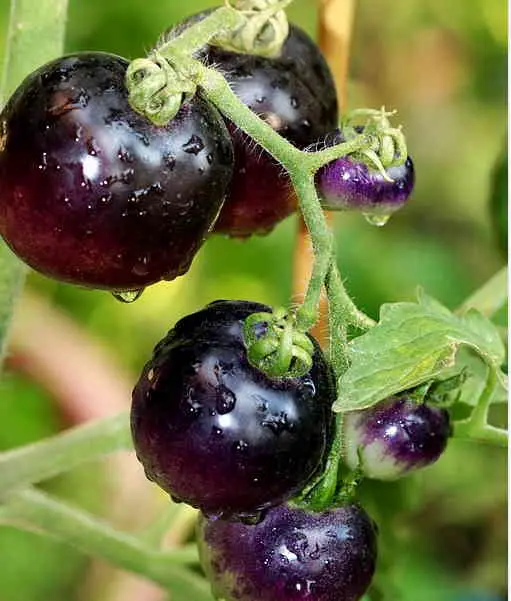Black tomatoes have been shown to have anti-inflammatory, antioxidant, and anti-cancer effects by scientists. They are one of the healthiest foods you can consume. It’s the same antioxidant found in other healthful fruits like black raspberries, black raspberries, and black mulberries that gives black tomatoes their dark color. One kind of black tomato is heirloom and the other is genetically engineered, but both are healthy.
The term “black tomato” refers to the tomato’s dark, black-purple hue. When it comes to Black tomatoes, the black Krim tomato is one of the most popular and frequently earns first place in taste tests.
Reader Poll: What online courses would interest you?
Even though it is a favorite of chefs across the globe, it has earned a cult following on the West Coast. A beefsteak type tomato, the Black Krim tomato is a heritage variety that may be identified by its scientific name, Lycopersicon esculentum, or Solanum Lycopersicum, “Black Krim.”

What Are Black Tomatoes Looks Like?
Most black tomato types progressively change color as they mature, turning from green to red or red-purple or a medium to dark violet or a very dark purple-blue that looks black as they ripen. Different hues may occur on the same botanical fruit, such as violet and green, a red-purple and green, or a very dark purple called black and green, depending on the kind.
Certain black tomato cultivars are all black, including the skin and flesh, however, this is quite uncommon. Only the peel or the flesh of the majority of black cultivars are completely black, while some have reddish-brown or purple-red flesh.
Subscribe to our newsletter!
Aside from the fact that there are many varieties of black tomatoes, you can see in the photographs below that there are regular-sized black tomatoes that are either round or ribbed like red beefsteak tomatoes, and there are black cherry tomato varieties. If you look at fresh or dried black tomato seeds, they’re usually the same color as conventional red tomato seeds: cream.
Are Black Tomatoes Edible?
The answer is yes, you can consume black tomatoes in whatever form you choose. Whether you want to eat them raw, boiled, pickled, turned into jam, salsa, or juice, or anything else, you may. Even though they seem to be something out of the ordinary, black tomatoes are nothing more than the same old tomato. They are not harmful to your health in any way (and neither are green tomatoes). Only if you are sensitive to tomatoes in general and other tomato hues should you avoid eating them.
Taste Of Black Tomatoes
There is something about black tomatoes that makes them both delicious and unique at the same time. As a result of their high anthocyanin concentration, black tomatoes have a flavor profile that is both sweet and astringent, with a well-balanced taste. However, although black tomatoes are significantly less astringent than their red counterparts, they are still highly tasty and should be eaten as soon as possible.
Why Tomatoes Turn Black?
There’s no doubt about i tomatoes are red. Is there a reason why there are so many black tomatoes? Is there a reason why they become this hue instead of red?
Natural compounds called carotenoids, chiefly lycopene, give red tomatoes their color. Because it has the same color as watermelon, lycopene is a good source of vitamin C
Black tomatoes, on the other hand, receive their color from anthocyanins, which include petunidin, malvidin, and delphinidin. It is anthocyanins that give black raspberries, blueberries, blackberries, and purple raspberries their distinctive color.
Tomatoes might be black or red, but they are still the same species. There is just one difference: When they are ripe, they create a distinct sort of color pigment. As the ripening process progresses, the genetic material of the botanical fruit changes, resulting in the fruit’s color changing.

Why Black Tomatoes Turns Red Inside?
Only a few black tomato cultivars are completely black, both on the outside and interior (or purple or blue or violet). Anthocyanin antioxidants are responsible for both the tomato’s dark skin and its lighter red-purple flesh.
Differences in coloration are caused by a difference in the anthocyanins that are exposed to the sun’s rays, such as those in the peel and the darker anthocyanins that are not exposed to sunlight. Black tomatoes that are completely black (or purple, blue, or violet) and black tomatoes that become red inside are the same.
Black Tomatoes May Be Genetically Altered
Some black tomato types are genetically engineered, while others aren’t. Tomatoes can generate a deeper color naturally, however, the genes for the darker color are typically not dominant.
Black tomatoes, for example, have grown more popular commercially as consumers believe they are healthier because of their deeper hue. Scientists have thus inserted genes from other plants that naturally generate a deeper hue to develop black tomatoes. Genetically modified (GM) black tomatoes have a deeper, more even coloration than their non-GM counterparts.
It is possible to cultivate heirloom black tomatoes by crossing tomatoes with deeper pigmentation, however, they tend to yield more unevenly colored fruits and are generally just a red-purple in hue.
Ripening Stage Of Black Tomatoes
Even if you’ve never grown or eaten black tomatoes before, you’ll be able to tell when they’re ripe if you’ve ever eaten tomatoes. There is nothing unique about black tomatoes; they are just a darker-colored variant of the tomato.
You want them to have a deep blue or purple or reddish-purple or greenish-purple hue when they’re mature; they should be firm but soft and juicy; they should also have a pleasant scent and taste that’s sweet and just somewhat astringent. To produce the finest flavor, these plants, like red tomatoes, need plenty of water and exposure to the sun.
Varieties Of Black Tomatoes
The following are considered to be black tomato varieties.
- Black Beauty
- Cherokee Purple
- Black Cherry
- Black Krim
- Velvet Night
- Chocolate Stripes
- Tasmanian Chocolate
- Black Mamba
- Paul Robeson
- Indigo Rose
- Chocolate Amazon
Conclusion
The nutritional value of black tomatoes is on par with that of red tomatoes, if not better. It is beneficial to eat black tomatoes because of their antioxidant and anti-inflammatory properties, which lower blood pressure.
To make matters worse, black tomatoes are an anticancer food that has been shown to scavenge free radicals and inhibit cell proliferation while also activating enzymes that fight angiogenesis and induce apoptosis. Both vitamin C and colored anthocyanins assist modify the immune system, which is boosted by the high vitamin C level.
A diabetic-friendly meal, black tomatoes have a low glycemic index and little impact on blood sugar levels. The low-calorie content and high water content both have tonifying benefits, making them an excellent choice for dieters.

